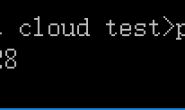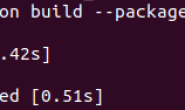python常用字典操作范例
# experimenting with the Python dictionary
# a seemingly unordered set of key:value pairs, types can be mixed
# Python23 tested vegaseat 13feb2005
# initialize a dictionary, here a dictionary of roman numerals
romanD = {'I':1,'II':2,'III':3,'IV':4,'V':5,'VI':6,'VII':7,'VIII':8,'IX':9}
print "A dictionary is an unordered set of key:value pairs:"
print romanD
# create an empty dictionary
D1 = {}
# show empty dictionary contents and length (number of item/pairs)
print "Empty Dictionary contains:"
# shows {}
print D1
# shows Length = 0
print "Length = ", len(D1)
# add/load new key:value pairs by using indexing and assignment
# here 'eins' is the key, 'one' is the key value
# the start of a german to english dictionary
D1['null'] = 'zero'
D1['eins'] = 'one'
D1['zwei'] = 'two'
D1['drei'] = 'three'
D1['vier'] = 'four'
# print loaded dictionary and length
# the dictionary key order allows for most efficient searching
print "Dictionary now contains (notice the seemingly random order of pairs):"
print D1
print "Length = ",len(D1)
# find the value by key (does not change dictionary)
print "The english word for drei is ", D1['drei']
# better
if 'drei' in D1:
print "The english word for drei is ", D1['drei']
# create a list of the values in the dictionary
L1 = D1.values()
# the list can be sorted, the dictionary itself cannot
L1.sort()
print "A list of values in the dictionary (sorted):"
print L1
# create a list of dictionary keys
L2 = D1.keys()
L2.sort()
print "A list of the dictionary keys (sorted):"
print L2
# does the dictionary contain a certain key?
if D1.has_key('null'):
print "Key 'null' found!"
else:
print "Key 'null' not found!"
# copy dictionary D1 to D2 (the order may not be the same)
D2 = D1.copy()
print "Dictionary D1 has been copied to D2:"
print D2
# delete an entry
del D2['zwei']
print "Dictionary D2 after 'zwei' has been deleted:"
print D2
# extract the value and remove the entry
# pop() changes the dictionary, use e3 = D2['drei'] for no change
e3 = D2.pop('drei')
print "Extract value for key = 'drei' and delete item from dictionary:"
print e3
print "Dictionary D2 after 'drei' has been popped:"
print D2
print
str1 = "I still miss you baby, but my aim's gettin' better!"
print str1
print "Count the characters in the above string:"
# create an empty dictionary
charCount = {}
for char in str1:
charCount[char] = charCount.get(char, 0) + 1
print charCount
print
if 't' in charCount:
print "There are %d 't' in the string" % charCount['t']
print
str2 = "It has been a rough day. I got up this morning put on a shirt and a"
str2 = str2 + " button fell off. I picked up my briefcase and the handle came off."
str2 = str2 + " Now I am afraid to go to the bathroom."
print str2
print "Count the words in the above string, all words lower case:"
# create a list of the words
wordList = str2.split(None)
# create an empty dictionary
wordCount = {}
for word in wordList:
# convert to all lower case
word = word.lower()
# strip off any trailing period, if needed do other punctuations
if '.' in word:
word = word.rstrip('.')
# load key:value pairs by using indexing and assignment
wordCount[word] = wordCount.get(word, 0) + 1
print wordCount
print
# put keys into list and sort
keyList = wordCount.keys()
keyList.sort()
# display words and associated count in alphabetical order
for keyword in keyList:
print keyword, "=", wordCount[keyword]
# put the dictionary pairs into a list, use the romanD dictionary
romanList = []
for key, value in romanD.items():
# put value first for a meaningful sort
romanList.append((value, key))
romanList.sort()
print "\nThe roman numeral dictionary put into a (value,pair) list then sorted:"
print romanList
print "\nList them as pairs on a line:"
for i in xrange(len(romanList)):
print romanList[i][0],'=', romanList[i][1]
print
# split the romanD dictionary into two lists
print "Splitting the romanD dictionary into two lists:"
romankeyList = []
romanvalueList = []
for key, value in romanD.items():
romankeyList.append(key)
romanvalueList.append(value)
print "Key List:",romankeyList
print "Value List:",romanvalueList
print
# make a dictionary from the two lists
print "Combining the two lists into a dictionary:"
romanD1 = dict(zip(romankeyList, romanvalueList))
print romanD1
# to save a Python object like a dictionary to a file
# and load it back intact you have to use the pickle module
import pickle
print "The original dictionary:"
print romanD1
file = open("roman1.dat", "w")
pickle.dump(romanD1, file)
file.close()
file = open("roman1.dat", "r")
romanD2 = pickle.load(file)
file.close()
print "Dictionary after pickle.dump() and pickle.load():"
print romanD2
print
# let's get rid of some duplicate words
str = "Senator Strom Thurmond dressed as as Tarzan"
print "\nOriginal string:"
print str
print "A list of the words in the string:"
wrdList1 = str.split()
print wrdList1
def uniqueList(anyList):
"""given a list, returns a unique list with the order retained"""
# create an empty dictionary
dic1 = {}
# use a list comprehension statement and the unique feature of a dictionary
return [dic1.setdefault(e,e) for e in anyList if e not in dic1]
# a call to the above function will retain the order of words
wrdList2 = uniqueList(wrdList1)
print "Convert unique list back to string (order retained):"
print " ".join(wrdList2)




